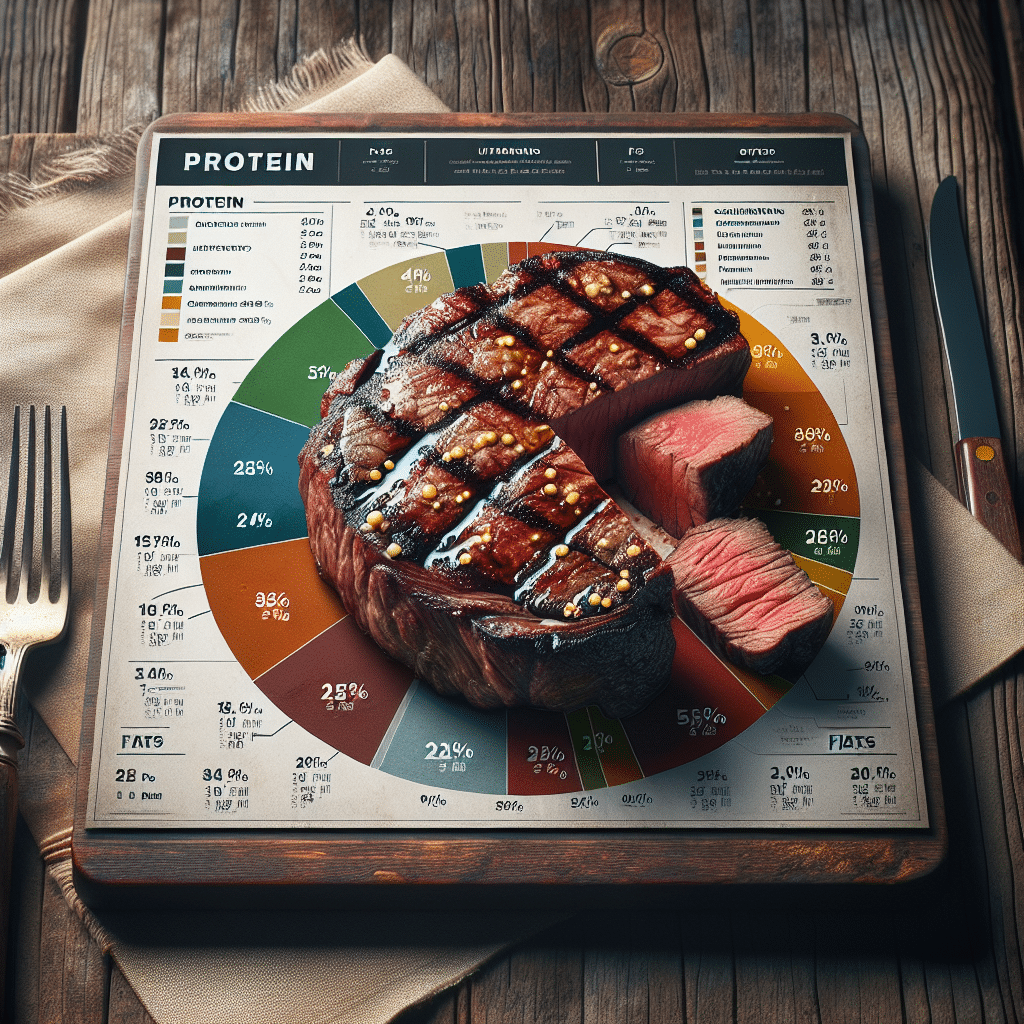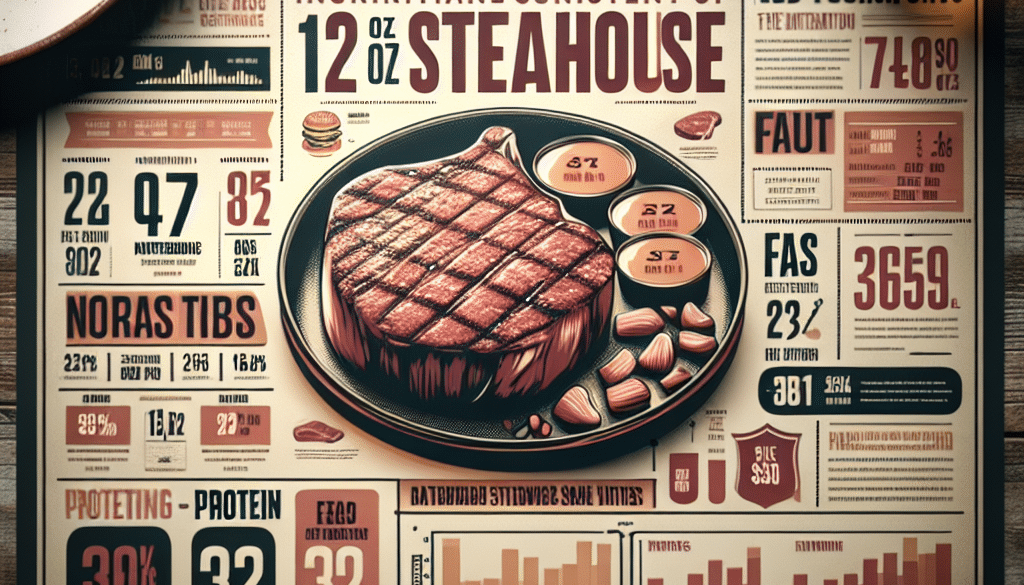Protein in 12 oz Steak: Steakhouse Nutrition Uncovered
-
Table of Contents
- Protein in 12 oz Steak: Unveiling Steakhouse Nutrition
- Understanding Protein in Steak
- The Protein Content of a 12 oz Steak
- Types of Steak and Their Protein Values
- Factors Affecting Protein Content
- Nutritional Benefits of Steak
- Iron and Zinc in Steak
- B-Vitamins and Other Nutrients
- Health Considerations and Dietary Balance
- Choosing Leaner Cuts
- Portion Control and Frequency
- Steakhouse Nutrition: Beyond the Protein
- Side Dishes and Sauces
- Cooking Methods and Seasonings
- Conclusion: Savoring Steak with Nutritional Awareness
- Discover ETprotein’s Plant-Based Protein Alternatives
Protein in 12 oz Steak: Unveiling Steakhouse Nutrition

When dining at a steakhouse, the allure of a perfectly cooked steak is hard to resist. The sizzle of a 12 oz steak on a hot plate is not just a treat for the taste buds but also a significant source of nutrition. Protein, being one of the essential nutrients in our diet, is abundantly found in steak. This article delves into the nutritional profile of a 12 oz steak, focusing on its protein content, and explores the broader implications for health and diet.
Understanding Protein in Steak
Protein is a macronutrient vital for building and repairing tissues, making enzymes and hormones, and serving as a building block of bones, muscles, cartilage, skin, and blood. A 12 oz steak is more than just a source of protein; it’s a powerhouse of nutrition.
The Protein Content of a 12 oz Steak
A typical 12 oz (340 grams) steak can provide a substantial amount of protein. Depending on the cut and preparation, a 12 oz steak can contain between 60 to 80 grams of protein. This amount can fulfill a significant portion of the recommended daily intake for adults, which is 46 grams for women and 56 grams for men, according to the USDA.
Types of Steak and Their Protein Values
- Ribeye: Known for its marbling and richness, a 12 oz ribeye steak contains about 69 grams of protein.
- Sirloin: A leaner option, a 12 oz sirloin steak offers around 75 grams of protein.
- Filet Mignon: Although tender and less fatty, a 12 oz filet mignon provides approximately 70 grams of protein.
- T-Bone: Offering two types of meat, the T-bone steak has about 66 grams of protein in a 12 oz serving.
Factors Affecting Protein Content
The protein content in steak can vary based on several factors, including the age and breed of the cattle, their diet, and how the meat is processed and cooked. Grass-fed beef, for example, is often leaner and can have a slightly different nutritional profile compared to grain-fed beef.
Nutritional Benefits of Steak
Steak is not only rich in protein but also packed with various essential nutrients. These include iron, zinc, B-vitamins (especially B12), and creatine. These nutrients play crucial roles in our body, from oxygen transport to energy metabolism and cognitive function.
Iron and Zinc in Steak
Red meat is an excellent source of heme iron, which is more easily absorbed by the body than non-heme iron found in plant sources. Zinc, another mineral abundant in steak, supports the immune system and metabolic function.
B-Vitamins and Other Nutrients
The B-vitamins, particularly B12, found in steak are crucial for nervous system health and energy production. Creatine, an amino acid stored in muscles, is beneficial for muscle growth and performance, making steak a favorite among athletes.
Health Considerations and Dietary Balance
While steak can be a nutritious part of the diet, it’s essential to consider the health implications of consuming red meat. The high saturated fat content in certain cuts of steak can contribute to heart disease if consumed in excess. It’s important to balance steak consumption with other protein sources and a variety of fruits, vegetables, and whole grains.
Choosing Leaner Cuts
Opting for leaner cuts of steak, trimming visible fat, and using healthier cooking methods like grilling or broiling can help reduce saturated fat intake while still enjoying the benefits of steak’s protein and nutrients.
Portion Control and Frequency
Practicing portion control and limiting red meat intake to a few times per week can help maintain a balanced diet and reduce the risk of chronic diseases.
Steakhouse Nutrition: Beyond the Protein
When dining at a steakhouse, it’s not just the steak that contributes to the meal’s nutritional value. Side dishes, sauces, and cooking methods all play a part in the overall healthiness of the dining experience.
Side Dishes and Sauces
Choosing side dishes like steamed vegetables or a fresh salad can enhance the meal’s nutritional profile. Be mindful of sauces and dressings, as they can add significant calories and fat.
Cooking Methods and Seasonings
Steakhouses often use high-heat cooking methods that can add to the flavor but may also increase the formation of harmful compounds. Opting for simpler seasonings and avoiding charred parts of the steak can reduce potential health risks.
Conclusion: Savoring Steak with Nutritional Awareness
A 12 oz steak from a steakhouse is a substantial source of protein and other essential nutrients. Understanding the nutritional content and health considerations can help steak enthusiasts make informed choices that support a balanced diet. By choosing leaner cuts, practicing portion control, and complementing steak with healthy sides, one can enjoy the savory pleasures of a steakhouse meal without compromising on nutrition.
Discover ETprotein’s Plant-Based Protein Alternatives
If you’re looking for plant-based protein options that align with a health-conscious lifestyle, ETprotein offers a range of high-quality vegan protein products. Their selection includes organic rice protein, clear pea protein, and various seed proteins, providing alternatives to traditional animal-based proteins. ETprotein’s products are non-GMO, allergen-free, and designed to cater to diverse dietary needs, making them an excellent choice for those seeking nutritious and sustainable protein sources.
About ETprotein:
ETprotein, a reputable plant protein vegan protein Chinese factory manufacturer and supplier, is renowned for producing, stocking, exporting, and delivering the highest quality organic bulk vegan protein and plant proteins. They include Organic rice protein, clear rice protein, pea protein, clear pea protein, watermelon seed protein, pumpkin seed protein, sunflower seed protein, mung bean protein, peanut protein etc. Their offerings, characterized by a neutral taste, non-GMO, allergen-free attributes, cater to a diverse range of industries. They serve nutraceutical, pharmaceutical, cosmeceutical, veterinary, as well as food and beverage finished product distributors, traders, and manufacturers across Europe, USA, Canada, Australia, Thailand, Japan, Korea, Brazil, and Chile, among others.
ETprotein specialization includes exporting and delivering tailor-made protein powder and finished nutritional supplements. Their extensive product range covers sectors like Food and Beverage, Sports Nutrition, Weight Management, Dietary Supplements, Health and Wellness Products, and Infant Formula, ensuring comprehensive solutions to meet all your protein needs.
As a trusted company by leading global food and beverage brands and Fortune 500 companies, ETprotein reinforces China’s reputation in the global arena. For more information or to sample their products, please contact them and email sales(at)ETprotein.com today.












